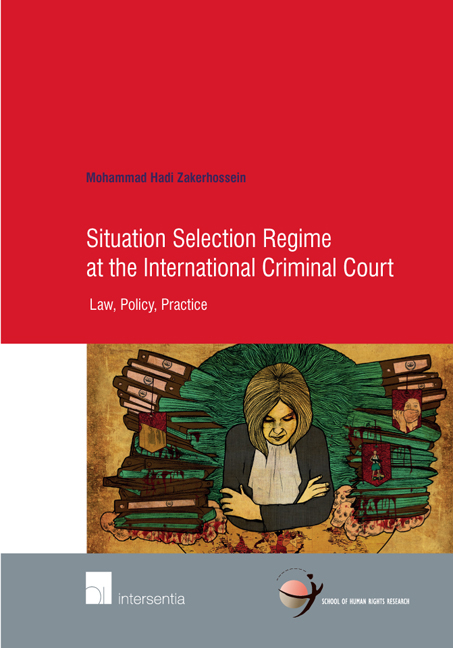Book contents
- Frontmatter
- Contents
- Acknowledgment
- Abbreviations
- General Introduction
- Part One Formulating the Concept of Situation in the Rome Statute Sense
- Part two Situation Selection Process
- Part three Situation Selection Criteria
- Part Four Situation Selection In Light Of Expressivism
- Conclusion
- Bibliography
- ICC Case Tables
- OTP Documents
- About the Author
- School of Human Rights Research Series
Part three - Situation Selection Criteria
Published online by Cambridge University Press: 13 October 2018
- Frontmatter
- Contents
- Acknowledgment
- Abbreviations
- General Introduction
- Part One Formulating the Concept of Situation in the Rome Statute Sense
- Part two Situation Selection Process
- Part three Situation Selection Criteria
- Part Four Situation Selection In Light Of Expressivism
- Conclusion
- Bibliography
- ICC Case Tables
- OTP Documents
- About the Author
- School of Human Rights Research Series
Summary
In the previous part, the process of situation selection was studied. The current part addresses the situation selection criteria. Selection is the product of evaluation, and each evaluation is carried out on the basis of one or more criteria, if it is not going to be arbitrary. In the preliminary examination process, the Prosecutor of the Court selects a situation within an evaluative framework. This evaluative framework is composed of the criteria introduced by the Rome Statute. To select a situation, these statutory criteria should be taken into account by the Prosecutor. Article 53 of the Statute numerates the factors that direct the Prosecutor in the situation selection process. According to Article 53(1), the Prosecutor shall examine whether three conditions as follows have been met: jurisdiction, admissibility (which in itself encompasses two elements: complementarity and gravity) and the interests of justice presumption. The ad hoc tribunals did not have to select a situation but regarding the selection of a case they lacked such criteria to direct prosecutors to select a case. The tribunals’ jurisdictions were limited to specified situations, but their prosecutors were almost free in selecting cases. Article 18 of the ICTY Statute, for instance, provided “the Prosecutor shall initiate investigations ex-officio or on the basis of information obtained from any source, particularly from Governments, UN organs, intergovernmental and nongovernmental organizations. The Prosecutor shall assess the information received or obtained and decide whether there is sufficient basis to proceed.” However, nowhere in the ICTY Statute was any insight into the notion of ‘sufficient basis’ offered. It was the prosecutorial discretion that determined if there was such a basis to proceed. Nonetheless, the Court's open mandates warranted the elaboration of the situation selection criteria in order to regulate the Prosecutor's powers. The Court operates selectively. Making a selection in an arbitrary manner and without transparency and consistency hurts the Court's legitimacy. Establishing the situation selection criteria was intended to avoid such an adverse consequence. In addition, preventing the emergence of a prosecutor with unfettered powers was another reason supporting the setting of some criteria for the situation selection.
At the ICC legal system, it is primarily the Prosecutor who decides when and where to intervene. Such independence has been considered as the strength of the Court and the basis for its legitimacy.
- Type
- Chapter
- Information
- Situation Selection Regime at the International Criminal CourtLaw, Policy, Practice, pp. 161 - 164Publisher: IntersentiaPrint publication year: 2017

